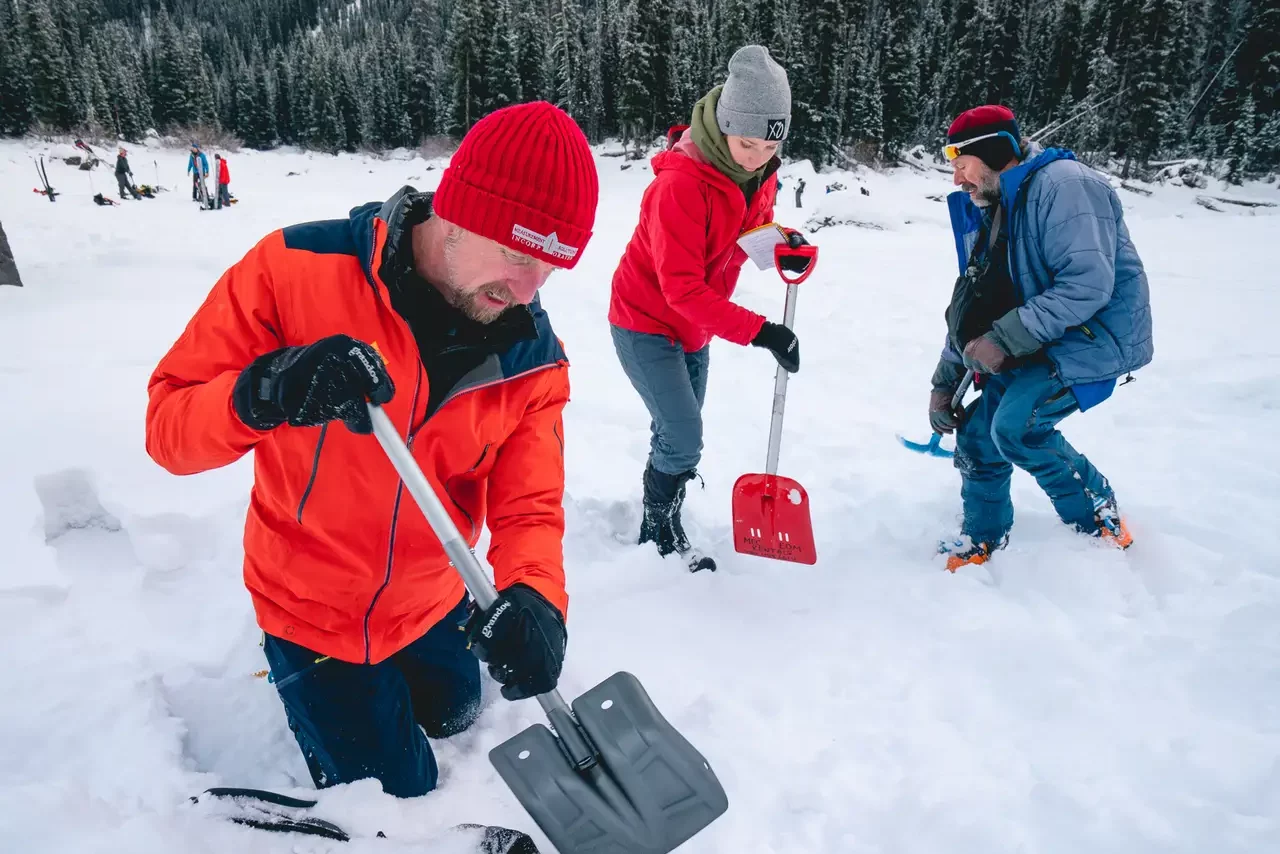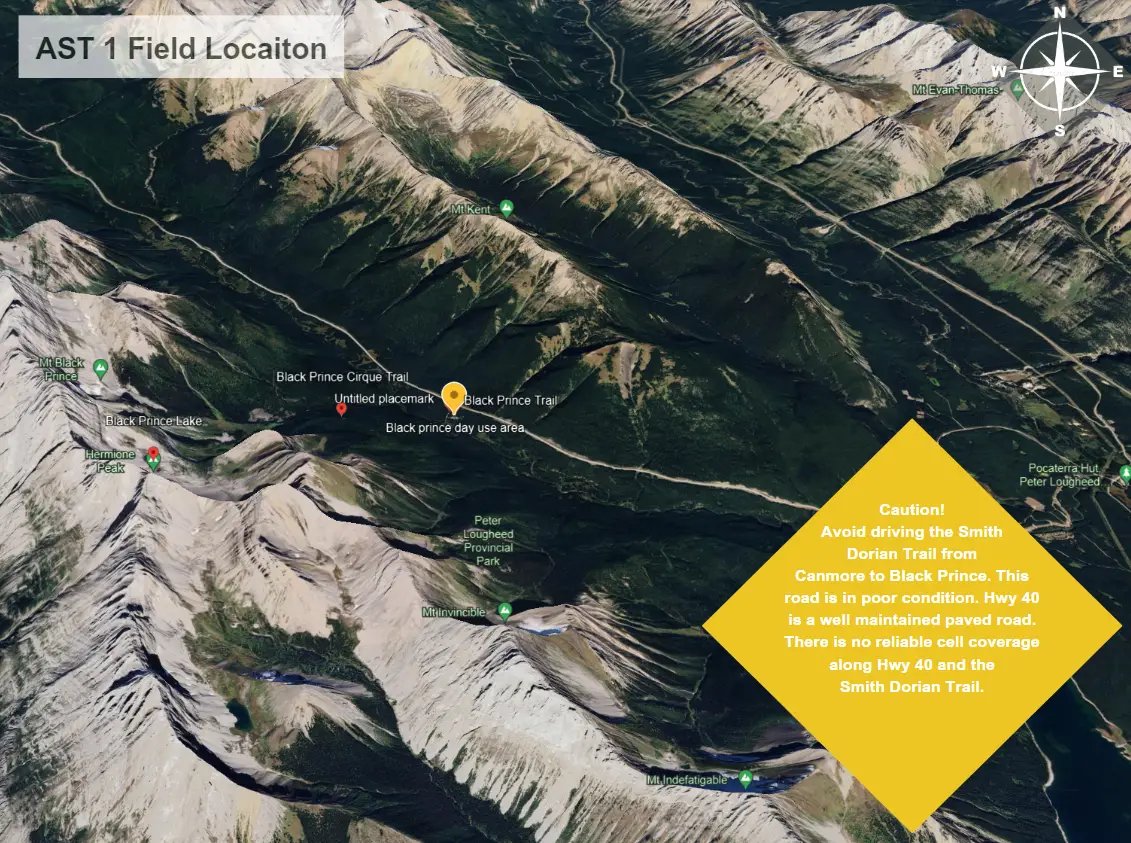Before registering, please review our Trip Waivers and Liability, and Cancellation Policies.
Camps are subject to minimum enrollment in order to run.
Winter backcountry travel is exploding in popularity. More people than ever before are taking their skiing outside of resort boundaries. But lacking education and awareness of avalanche hazard can prove fatal for you or for your partners. Completing an AST1 course is now almost considered a mandatory requirement before venturing into the backcountry.
Our 2-day course provides a thorough introduction to avalanche basics and a framework with which to make decisions in the field. We cover the standard curriculum (as outlined by Avalanche Canada). By the end of this course you will know how to identify avalanche terrain, complete an avalanche rescue and how to read the avalanche bulletin so you can start planning your own backcountry adventures.
Instead of a classroom day, this winter we will be doing it through two evening, online sessions during the week before your course. You can choose to do your field day on either the following Saturday or Sunday. This means that you still get a day off while doing the classroom portion at a more convenient time!

Guides for this trip are still being confirmed.
We have a dedicated team of instructors (above) who are excited to provide you with knowledge to start of your backcountry experiences safely. We want to provide the best possible learning experience and give you maximum opportunity to ask questions. So for our field day on Day 3, we bring in an extra guide/instructor where necessary to keep participant-to-guide ratios below a maximum of 8:1.
The ACC hires guides certified by the Association of Canadian Mountain Guides (ACMG). Visit the ACMG website to learn more about what they do!
*Guiding Staff for a trip sometimes have to swapped out due to unavoidable circumstances. In this event ACC staff with contact you as soon as possible to update you on any changes to trip staffing
To keep the cost of this camp as low as possible for you, food is not provided on this camp. Be sure to bring along a packed lunch and your favourite snack to fuel the field day!
Accommodation is not included in this course.
If you don't have everything on the gear list and aren't ready to invest in your own, there are many awesome local businesses that rent out all of the equipment you will need. Be sure to reserve your rentals ahead of time to make sure everything you need is available for you when you need it.
Coming from the Bow Valley? Check out Gear Up in Canmore. ACC members get 10% off all gear rentals!
Cornices and crevasses. Trees, tree wells, and tree stumps. Cliffs, creeks, rocks and boulders. Holes and depressions below the snow surface. Variable and difficult snow conditions. Snowcat roads and road ranks. Fences and other man-made structures. Impact or collision with other persons, vehicles or objects. Encounters with domestic or wild animals. Loss of balance or control. Becoming lost or separated from the group. Slips, trips, and falls.
Mitigated by Trained and experienced Guide.
The use of Radios.
Slips trips and falls indoor or outdoor. Equipment failure. Infectious disease contracted through viruses, bacteria, parasites, and fungi which may be transmitted through direct or indirect contact. Negligence of other persons, including other guests. Negligent first aid. Negligence of the guide Including failure to take reasonable steps to safeguard or protect you from, or warn you of risk, dangers, hazards, on participating in ACC activities
Developed safety plans and procedures with decades of experience managing risk.
Avalanches can occur in the terrain you will be entering. Caused by natural forces, or by people travelling through the terrain (skiing/snowboarding). Anyone caught in an avalanche is at risk of personal injury, death, and/or property damage or loss.
Certified Guides with experience and training to manage this risk.
Daily risk assessment processes.
Guest training
Communication can be difficult and in the event of an accident, rescue and treatment may not be available. Adverse weather may also delay the arrival of treatment and transport out of the field. If an Injury occurs in challenging terrain movement to an evacuation point may be slow.
First Aid / Rescue Training.
Satellite Communications
Even when set up correctly, a ski binding might not release during every fall or may release unexpectedly. The ski boot/binding system is no guarantee that the skier will not be injured. Non-DIN-certified bindings, such as pin/tech bindings, present a higher risk of pre-release and/or injury as they are not designed to the same safety standards as a DIN-certified alpine binding.
Unlike alpine ski boot/binding systems, snowboard and some telemark boot/binding systems are not designed or intended to release and will not release under normal circumstances. Using such a system increases the risk of injury and/or death when caught in an avalanche.
None

We appreciate that the lands known today as Canada are home to the enduring presence of all First Nations and Métis people, and the Inuit and we acknowledge the past, present, and future generations of these Nations who continue to lead us in stewarding this land, as well as honour their knowledge and cultural ties to this place. The Alpine Club of Canada’s head office is located in the traditional lands of Treaty 7, which is comprised of the Stoney Nakoda Nations of Wesley, Chiniki, and Bearspaw; three Nations of the Blackfoot Confederacy: the Piikani, Kainai, and Siksika; the Mountain Cree; and the Tsuu T’ina of the Dene people. This territory is also shared with the Métis Nation of Alberta, Region III. Before the signing of Treaty 7, and prior to the establishment of provincial boundaries, this region was also used by the Ktunaxa and the Maskwacis people.
General Inquiries
Phone: 403-678-3200
Email: [email protected]
201 Indian Flats Rd.
PO Box 8040 Main St, Canmore, AB, T1W 2T8, Canada
Office Hours: Monday – Friday, 9am – 5pm
The Alpine Club of Canada is a registered Amateur Athletic Association and a registered Canadian charity (Registration No: 10670 4182 RR0001). The ACC’s US Foundation can accept charitable donations from donors living in the United States. We will issue a charitable tax receipt for eligible donations of $20 or more.